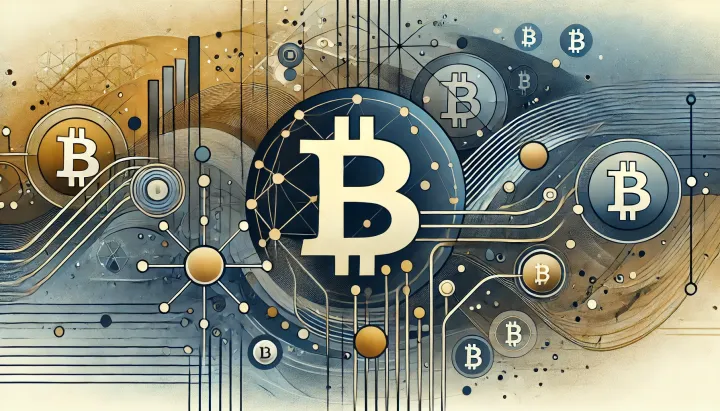Bitcoin’s Decentralized Free Market Transition
This April 12, 2025 episode of the Robin Seyr Podcast featuring Jeff Booth examines Bitcoin’s potential to build a decentralized, deflationary free market. It highlights the need for active participation, technological upgrades against quantum threats, and a shift from fiat-based valuation.

- My 'briefing notes' summarize the content of podcast episodes; they do not reflect my own views.
- They contain (1) a summary of podcast content, (2) potential information gaps, and (3) some speculative views on wider Bitcoin implications.
- Pay attention to broadcast dates (I often summarize older episodes)
- Some episodes I summarize may be sponsored: don't trust, verify, if the information you are looking for is to be used for decision-making.
Summary
This April 12, 2025 episode of the Robin Seyr Podcast featuring Jeff Booth examines Bitcoin’s potential to build a decentralized, deflationary free market. It highlights the need for active participation, technological upgrades against quantum threats, and a shift from fiat-based valuation. The discussion underscores both technical and behavioral imperatives for sustainable network evolution.
Take-Home Messages
- Active Participation: Running nodes and maintaining self‑custody are fundamental to preserving Bitcoin’s decentralization.
- Deflationary Markets: Bitcoin’s inherent deflation creates a free, competitive global market that challenges conventional finance.
- Quantum Preparedness: Proactive, community‐driven upgrades are essential to mitigate future quantum threats.
- Fiat Measurement Risks: Valuing Bitcoin in fiat can inadvertently support centralization, undermining network security.
- System Transition: The inevitable shift from centralized control to a decentralized model offers vast opportunities despite inherent chaos.
Overview
Jeff Booth articulates a vision in which Bitcoin enables a transition to a free, decentralized global market through active user engagement, such as running nodes and practicing self‑custody. He emphasizes that these practices are crucial for maintaining the network’s security and deflationary benefits.
Booth contrasts the deflationary, cooperative dynamics of Bitcoin with the exploitative nature of centralized, inflationary fiat systems. He argues that measuring Bitcoin in fiat undermines its core principles and could lead to unintended centralization.
The discussion further explores technical challenges, notably the threat of quantum computing, and the necessity for proactive protocol upgrades. Booth advocates for community-driven solutions to ensure that security remains robust against future technological shifts.
Behavioral factors also emerge, with Booth highlighting the tension between short‑term speculative gains and long‑term network integrity. He posits that sustained economic freedom depends on a committed, honest participation in the Bitcoin ecosystem.
Stakeholder Perspectives
- Bitcoin Advocates: Support the push for self‑custody and active node participation to preserve decentralization.
- Institutional Investors: Weigh the risks of transitioning from a fiat valuation model to Bitcoin’s native deflationary metrics.
- Developers: Prioritize innovations such as quantum-resistant protocols to uphold network security.
- Policymakers: Monitor regulatory impacts as decentralized financial models evolve, balancing innovation with oversight.
- General Users: Seek accessible education and practical applications that reinforce Bitcoin’s free market dynamics.
Implications and Future Outlook
The episode implies that Bitcoin’s transition toward a decentralized free market may fundamentally reshape global economic interactions. Ensuring robust participation and education is critical to counteract centralizing forces. Stakeholders across sectors must adapt to a system where value and security are directly linked to decentralized engagement.
Technological resilience emerges as a key theme, particularly the need to prepare for quantum computing threats. Proactive upgrades and community consensus are essential to maintain Bitcoin’s integrity in a rapidly evolving landscape. This interdisciplinary challenge bridges technical innovation with economic and policy reforms.
The broader shift from a fiat-based, centralized system to a decentralized model is portrayed as both chaotic and opportunity-rich. As traditional financial infrastructures falter, Bitcoin offers an alternative framework that rewards honest participation and efficiency. The evolution calls for resilient social and technological infrastructures to support sustainable growth.
Some Key Information Gaps
- What timeline indicators best predict the advent of quantum computing threats to Bitcoin? This question is critical as it informs proactive security measures necessary for long-term protocol resilience. Accurate forecasts will help align the community’s upgrade strategies with credible technical milestones.
- What factors limit user engagement in running Bitcoin nodes? This question is essential because the decentralized security of Bitcoin depends on robust node participation. Addressing this knowledge gap could foster higher engagement, thereby strengthening network stability.
- What influences lead investors to favor speculative gains over active network participation in Bitcoin? This question is pivotal as it relates to sustaining the honest network by ensuring that investors contribute beyond passive trading. Understanding these drivers could help realign incentives towards long-term decentralization.
- How could government policies interfere with the decentralized operations of Bitcoin? This question is significant given the potential for state intervention to reshape Bitcoin’s economic dynamics and free market character. Analyzing this issue will illuminate how regulatory frameworks might either hinder or support Bitcoin’s evolution.
- How sustainable is Bitcoin's low fee model in supporting miner incentives over the long term? This question matters because the protocol’s economic viability hinges on the delicate balance between transaction fees and network security. Insights here would inform scalability measures essential to preserving the ecosystem’s operational efficiency.
Broader Implications for Bitcoin
Decentralized Economic Autonomy
The evolution toward a decentralized market model could dramatically shift global financial power away from monopolistic institutions. By empowering individuals and communities through self-custody and direct participation, Bitcoin may foster a more equitable economic landscape. This broader change offers the potential for enhanced innovation and reduced systemic inequality in global finance.
Socioeconomic Disruption and Empowerment
Bitcoin’s transition toward a free, decentralized market carries far‐reaching implications for socioeconomic structures traditionally dominated by centralized authority. By empowering individuals through self‑custody and reducing reliance on intermediaries, Bitcoin could democratize access to financial services and stimulate grassroots economic activity. Over time, this shift might contribute to more inclusive economic models that prioritize transparency, shared prosperity, and local autonomy.
Digital Governance Evolution
The active, decentralized participation that Bitcoin demands hints at a transformative approach to governance beyond traditional hierarchies. As communities increasingly manage security and protocol upgrades collectively, similar models could inspire new frameworks for regulatory and administrative oversight in other domains. This evolution in digital governance has the potential to foster enhanced transparency and accountability, influencing broader political and economic institutions.
Technological Convergence and Innovation
The proactive drive toward quantum resistance and secure protocol evolution in Bitcoin may accelerate cross-disciplinary innovations. This push is likely to attract collaboration between experts in cryptography, computer science, and economics, leading to breakthroughs that extend beyond Bitcoin itself. The ripple effects of these technological advancements could redefine best practices in cybersecurity and distributed systems across various industries.
Behavioral and Incentive System Transformation
The tension between speculative investment and genuine network participation raises important questions about human behavior in financial markets. As incentives evolve to reward active contribution rather than passive trading, the overall culture of financial engagement may shift toward long-term value creation. This transformation could influence other sectors by establishing new standards for accountability, performance, and sustainable economic practices.



Comments ()